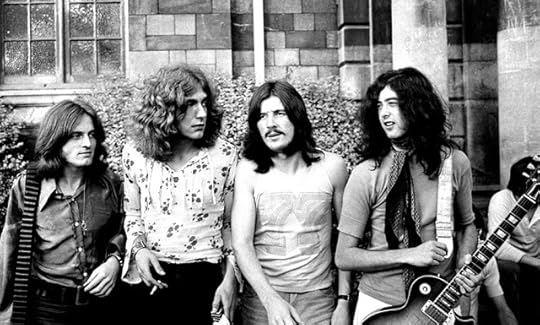More on Led Zeppelin (One)
 While still at art school, Jimmy Page turned down the opportunity to replace Eric Clapton in the Yardbirds, snubbing the offer in favor of session work and recommending Jeff Beck in his place. Page realized that despite the Yardbird's success, he could make more money working as a studio musician and subsequently sold his wares to bands as diverse as Them and Herman's Hermits, The Who and Joe Cocker. It was at this point in the 20-year-old's career that he saw Burt Bacharach step into a Rolls Royce and realized how much money there was to be made without the relentless schedule of a rock band.
While still at art school, Jimmy Page turned down the opportunity to replace Eric Clapton in the Yardbirds, snubbing the offer in favor of session work and recommending Jeff Beck in his place. Page realized that despite the Yardbird's success, he could make more money working as a studio musician and subsequently sold his wares to bands as diverse as Them and Herman's Hermits, The Who and Joe Cocker. It was at this point in the 20-year-old's career that he saw Burt Bacharach step into a Rolls Royce and realized how much money there was to be made without the relentless schedule of a rock band. In the summer of '66, Page hooked up with Beck, Keith Moon (drums), Nicky Hopkins (keyboards) and bass session player John Paul Jones. It was at that impromptu jam that Keith Moon hinted that the band would go over like a "led balloon." The session was the catalyst for Jimmy temporarily joining Beck in the Yardbirds, but Beck abruptly left the band during the American leg of their tour. "It [we] could have been even better than the Stones," Jimmy said, had Beck not been "his own worst enemy."
When The Yardbirds finally fell apart, Page was determined to keep the show on the road – even if it meant replacing everyone in the band, which he did, recruiting John Paul Jones, on bass and keyboards, and adding two newbies, 19-year-old vocalist Robert Plant and John Bonham. The band played a few sessions as The New Yardbirds and then changed their name to Led Zeppelin. It was December 1968.
Twelve days after the tour and the group's return to the U.K., Page took his new band to Olympic Studios, a popular eight-track venue in Barnes, South London – the same studio the Stones had recently recorded Beggars Banquet. Nine days later, after a total of just 30 hours in the studio, the album was recorded, mixed and mastered. Total cost, including artwork: £1,782, about $2500. (In comparison, Brian Wilson's production of "Good Vibrations" took some 90 hours over a seven month period at a cost of between $50,000 and $75,000.)

The LP contains only three original compositions, but let's again toss away any controversy with the cold hard fact that blues music, even the electric blues that Zeppelin hoped to capture, was a genre of copycats; borrowing from the work of others was a blues tradition. Here, for instance, is the evolution of "Black Mountain Side," an acoustic guitar instrumental in the exotic, modal style of Page's earlier Yardbirds-era showcase, "White Summer." Where "White Summer" had been Page's interpretation of Davy Graham's "She Moved Through the Fair," which, in turn, was Graham's interpretation of "She Moved Through The Bizarre," "Black Mountain Side" was Page's instrumental take on Bert Jansch's 1966 recording of a traditional Gaelic folk tune titled "Black Water." The reality is, Jansch's version pales in comparison to Page's, and that is the end of that story. Not original to Page. Not original to Jansch. Phenomenal interpretations by both.
Call it what you will, the eponymous Led Zeppelin remains the ultimate electric blues LP and rather than controversy, music lovers should be relishing in its incredible accomplishment in an era when hard rock began and ended with The Who, who just weren't very hard.
Published on January 04, 2019 05:14
No comments have been added yet.



